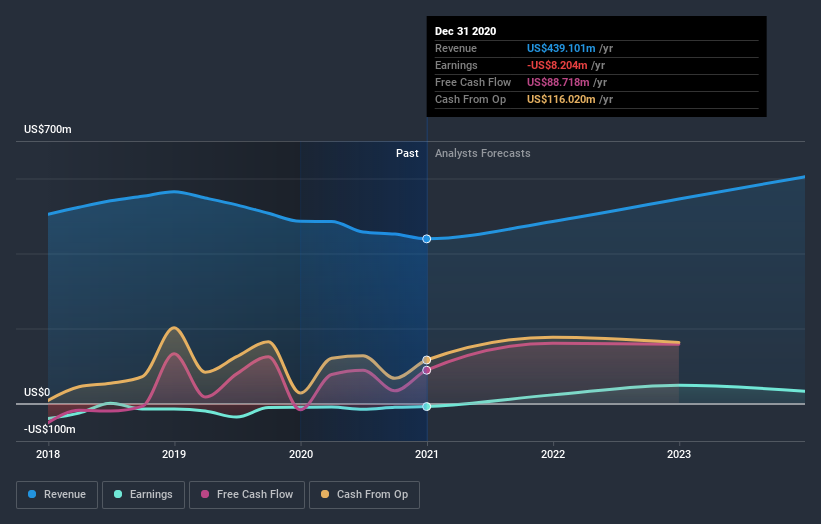Results: EVO Payments, Inc. Delivered A Surprise Loss And Now Analysts Have New Forecasts
EVO Payments, Inc. (NASDAQ:EVOP) shareholders are probably feeling a little disappointed, since its shares fell 2.9% to US$25.46 in the week after its latest yearly results. Things were not great overall, with a surprise (statutory) loss of US$0.03 per share on revenues of US$439m, even though the analysts had been expecting a profit. This is an important time for investors, as they can track a company's performance in its report, look at what experts are forecasting for next year, and see if there has been any change to expectations for the business. Readers will be glad to know we've aggregated the latest statutory forecasts to see whether the analysts have changed their mind on EVO Payments after the latest results.
Check out our latest analysis for EVO Payments
Following the latest results, EVO Payments' nine analysts are now forecasting revenues of US$485.5m in 2021. This would be a solid 11% improvement in sales compared to the last 12 months. Earnings are expected to improve, with EVO Payments forecast to report a statutory profit of US$0.53 per share. In the lead-up to this report, the analysts had been modelling revenues of US$496.1m and earnings per share (EPS) of US$0.76 in 2021. From this we can that sentiment has definitely become more bearish after the latest results, leading to lower revenue forecasts and a large cut to earnings per share estimates.
The analysts made no major changes to their price target of US$28.45, suggesting the downgrades are not expected to have a long-term impact on EVO Payments' valuation. It could also be instructive to look at the range of analyst estimates, to evaluate how different the outlier opinions are from the mean. There are some variant perceptions on EVO Payments, with the most bullish analyst valuing it at US$33.00 and the most bearish at US$21.00 per share. As you can see, analysts are not all in agreement on the stock's future, but the range of estimates is still reasonably narrow, which could suggest that the outcome is not totally unpredictable.
Taking a look at the bigger picture now, one of the ways we can understand these forecasts is to see how they compare to both past performance and industry growth estimates. It's clear from the latest estimates that EVO Payments' rate of growth is expected to accelerate meaningfully, with the forecast 11% revenue growth noticeably faster than its historical growth of 2.8%p.a. over the past five years. By contrast, our data suggests that other companies (with analyst coverage) in a similar industry are forecast to grow their revenue at 14% per year. So it's clear that despite the acceleration in growth, EVO Payments is expected to grow meaningfully slower than the industry average.
The Bottom Line
The biggest concern is that the analysts reduced their earnings per share estimates, suggesting business headwinds could lay ahead for EVO Payments. Unfortunately, they also downgraded their revenue estimates, and our data indicates revenues are expected to perform worse than the wider industry. Even so, earnings per share are more important to the intrinsic value of the business. There was no real change to the consensus price target, suggesting that the intrinsic value of the business has not undergone any major changes with the latest estimates.
With that in mind, we wouldn't be too quick to come to a conclusion on EVO Payments. Long-term earnings power is much more important than next year's profits. We have estimates - from multiple EVO Payments analysts - going out to 2023, and you can see them free on our platform here.
It might also be worth considering whether EVO Payments' debt load is appropriate, using our debt analysis tools on the Simply Wall St platform, here.
This article by Simply Wall St is general in nature. It does not constitute a recommendation to buy or sell any stock, and does not take account of your objectives, or your financial situation. We aim to bring you long-term focused analysis driven by fundamental data. Note that our analysis may not factor in the latest price-sensitive company announcements or qualitative material. Simply Wall St has no position in any stocks mentioned.
Have feedback on this article? Concerned about the content? Get in touch with us directly. Alternatively, email editorial-team (at) simplywallst.com.


